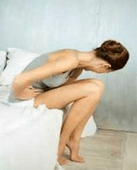Due to the anatomical characteristics of the female body, inflammation of urinary tract inflammation - cystitis - is considered a female disease.
In women, the bladder usually needs to be empty than men and is more susceptible to various microorganisms, bacteria and viruses that may cause cystitis in women.
The symptoms and treatment of the disease depend directly on many factors, the nature of the process, the localization, the infected pathogen, and is classified by:

- Depending on the location of the inflammatory process in the urine system - the mucus, muscle or submucosal layer of the bladder may be damaged.
- By nature of the disease - acute or chronic.
- According to morphology changes - Katahar, cystic, ulcer, bleeding, granuloma, tumor shape, etc.
- Depending on the pathogen, it can be bacteria (Escherichia coli, Staphylococcus, Streptococcus, uric acid phosphate, Mycoplasma, gonorrhea, tuberculosis, etc.), viruses, viruses, fungal and nonbacterial and nonbacterial and nonbacterial (allergic, drug, chemistry, chemistry), which may be caused by (possibly by chiration).
With Cystitis - Which doctor should you contact?
Cystitis is very painful when urinating quickly, burning and sharp pain after emptying. The progression of cystitis is very painful, with low bladder temperatures, low body temperatures, and sometimes even mixing blood and mucus in the urine.If the woman has the listed symptoms, which doctor can she contact?
To clarify the diagnosis, first, you should contact the urologist, as it is the doctor who is engaged in the diagnosis and treatment of cystitis for examination, and the urine analysis of Nechiporenko must be performed - a general analysis, bacteria seeding, ultrasound of the bladder and cystoscopia.
Furthermore, it is necessary to visit a gynecologist, because cystitis may usually be caused not only by mediocre bacteria but can also be combined with sexually transmitted infections, so examinations of gynecologists and smears for vaginal flora studies are also necessary.For women with cystitis, treatment includes both antibiotics and urea, and can sometimes be prescribed by bladder infusion and physical therapy.
Causes of cystitis in women
Most commonly, the cause of cystitis in women is infectious drugs because the vagina, anus, short and quite wide urethra is located in the penetration of various pathogenic microorganisms along the ascending path of the ascending microorganisms.However, there are other ways to penetrate bacteria into the urine system:
- The upward path is the urethra, i.e.
- Descending path - instead, from the upper urinary tract
- Lymph - From other small pelvic organs
- Hematoma is a rare method of penetrating infection from remote organs.
When a woman suffers from symptoms of cystitis, you should not self-cultivate because of the cause of cystitis, pathogens are numerous, and for the right and successful treatment, you should first determine them, clarify their sensitivity to antibacterial drugs before prescribing a full treatment.
Cystitis in women is rarely an isolated process, when hygiene, constipation, cold, abuse of sharp products or alcohol, use of underwear, strings, partner changes, rare bladder emptying, etc.Leads to the reproduction of mediocre pathogenic bacteria.In 80%, these are E. coli, and in 15% of Staphylococcus, there are 5% of other bacteria such as pseudo-based, klebsiella, proteus.
- In most cases, cystitis occurs in the context of inflammatory processes in the vagina or in the female reproductive organ diseases, such as bacterial vaginosis, thrush, which is transmitted through (gonorrhea, moxa, granuloma, chlamydia, diapers), and is sometimes accompanied by cinsitisitis claristisation of tuberculculcul of genberculculcul of genberculculculcul of genberculculsis of genberculculis of genberculsos Organs organs organs organs organs organs organs organs organs organs organs organs organs organs organs organs organs organs organs organs organs organs organs organs organs organs organs organs organs organs organs organs organs organs organs organs organs organs organs organs organs organs organs organs organs organs organs organs organs organs organs organs organs organs organs organs organs organs organs organs organs organs organs organs organs organs organs organs organs organs organs organs organs organs organs organs organs organs organs organs organs organs organs organs organs organs organs organs organs organs organs organs organs organs organs organs organs organs organs organs organs organs organs organs organs organs organs organs organs organs organs organs organs organs organs organs organs organs organs organs organs organs organs organs organs organs organs organs organs organs organs organs organs organs organs organs organs organs organs organs organs organs organs organs organs organs organs organs organs organs organs organs organs organs organs organs organs organs organs organs organs organs organs organs organs organs organs organs organs organs organs organs organs organs organs organs organs organs organs organs organs organs organs organs organs organs organs organs organs organsFor a long time, many hidden infections and tuberculosis were asymptomatic, and ignorantly, women only experience some discomfort, sub-release temperature, weakness, no visits to doctors, and are not suitable for diagnostic centers that study mild diseases.
- Other provocative factors in the development of cystitis include pyelonephritis, stones in the bladder, and stagnation of urine in the diverticulum.
- Usually, cystitis occurs in pregnant women, which is explained by changes in the flora and vagina, with the urology area under the influence of endocrine and hemodynamic recombination in pregnant women.
- If a woman has diabetes, she often displays allergic reactions, and she will be subject to persistent toxic effects or treated with radiation therapy for cancer - these are also risk factors for cystitis.
- Sometimes, after surgical procedures, surgery, endoscopy, mucosa injury, which helps the development of cystitis in women.
- Symptoms of cystitis also occur during menopause because menopause atrophy changes in the body, and the lack of estrogen is also reflected in the urogenital tract.
In addition to acute cystitis, many women suffer from chronic inflammatory processes in the context of chronic infections listed above, or women's chronic cystitis is associated with missed uterine and vagina.
Symptoms of cystitis in women
After provocative factors (such as injury, cold), after unprotected sexual intercourse, infectious diseases, etc., women may develop acute cystitis, which always start very sharply, and suddenly start suddenly:
- Urination - Urinate quickly, rubber, urethral burning and pain in the bladder, constant desire to empty the bladder.
- Before urinating, women usually have to work hard and work hard.The frequency of impulses is so high that women have to go to the toilet every 15 minutes, and sometimes there is involuntary urinary incontinence.
- Nicturia is the desire to empty the bladder at night.
- Pain is usually accompanied by the beginning and end of the urination process.Outside of the emptying process, the pain is located only in the pubic part and in the vagina.The intensity of the pain can vary, from mild discomfort to unbearable intense and sharp attacks.
- Urine almost always has cystitis, and it is muddy and purulent.
- In acute cystitis, the temperature can rise to 38c respectively, weak, and overall well deterioration.
- Typically, after the first acute process, if acute cystitis develops again one month after treatment, a recurrence of the disease occurs, thus indicating a preservation infection.
- In women with chronic cystitis, the symptoms and treatment of the disease are the same, and the frequency of pain and urination may not be so obvious.During the period of intensification of chronic processes, clinical conditions of acute cystitis may occur, and neither laboratory nor symptom data indicate the inflammatory process during remission.

Treatment of cystitis in women
To treat acute and chronic cystitis in women, you should seek advice from both a gynecologist and a urologist.Usually in the proper treatment of acute cystitis, this treatment actually occurs within a week.
If the infectiousness of cystitis in women is confirmed, antibiotics that are designed to destroy pathogenic microorganisms with antibacterial drugs, which are sensitive to pathogens:
- Recently, fluoroquinolones such as ciprofloxacin, norfloxacin, phosphogenin, nitrofuran, have been widely used in women among women.These drugs used to treat cystitis in women have side effects and have many contraindications, so their use is only possible according to the doctor's regulations.
- If a specific bacterial flora is found based on the analysis, treatment includes possible antiviral, antifungal or antibacterial drugs.
- Prescribe severe pain, anti-impurities or non-replacement anti-inflammatory drugs.
- If you don't have an allergic reaction to herbs, you can use a variety of plant leaf foliage, wild horse tail, UVA URSI variants.It is better not to use herbs in a bag, but to gather, powdery form - brew and stick to them like any regular medicinal herb.
- Natural fungicides are effective treatments for cystitis, which is a one-time administration of this drug.
- There are also a large number of tablet drugs of plant origin that are used as auxiliary drugs during acute inflammation and should be consumed for a long time to last longer.Cranberries also help many peopleCranberry Fruit DrinkTablets with cystitis or drugs containing cranberry extract.
- During the treatment of cystitis, women should increase their daily fluid intoxication to quickly eliminate toxins in their bodies, and it is also worth sticking to a diet that lowers the cream fat.
Cystitis Prevention - Useful Tips for Women
- If a man does not observe hygiene and does not use condoms during sexual intercourse, urinary cystitis associated with sexual life and temporary infections associated with sexual life occur.
- Adhering to personal hygiene is the key to recurrence of bacterial cystitis.The use of neutral acid-based balance is used for intimate hygiene.
- Control the fullness of the bladder and empty it in time, and do not allow long-term urine stagnation.
- Smoping, especially wet legs, caused an intensification in cold weather.
- Drink at least 2 liters of water every day, fresh squeezed juice or cranberry fruit drink.
- If you have chronic cystitis, don't wear sheep's panties when wearing this linen, the intestines can easily become easy on the urethra.Moreover, do not wear too tight clothes or jeans to disrupt normal blood circulation in the pelvic area.
- Construction can also cause recurrence of cystitis, try to include dried apricots, plums, fresh cabbage, and other fruits and vegetables in your daily diet.





























